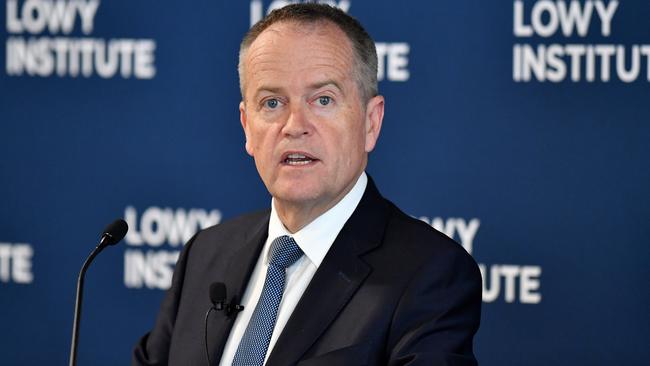Labor won’t follow US lead on China relations, Bill Shorten says
An incoming Labor government will not view China as a strategic threat, in contrast with the US view, Bill Shorten warns.

Bill Shorten has signalled an incoming Labor government will not follow the lead of the United States by portraying China as a strategic threat, saying relations with the Asian superpower would be framed around the Australian national interest.
In a major foreign affairs speech to the Lowy Institute today, the Opposition Leader flagged a more independent-minded foreign policy to balance the US and China relationships, while reinvigorating relationships with Japan and South Korea, and deepening defence and economic ties with India.
Mr Shorten said the US relationship was a pillar of Australia’s foreign policy — anchored by the ANZUS treaty — and Australia’s interests were best served when the United States was engaged in the region.
But Donald Trump’s America First stance made it clear the US was no longer prepared to prop up the global order, and Australia’s interests would not always align with those of the United States, Mr Shorten said.
“Our national focus is different, our relationships with our close neighbours are different, our economies have different structures,” he said.
Mr Shorten noted Labor had opposed the second Iraq war, and had spoken out on the US decision to withdraw from the Paris climate agreement.
As President Trump accuses China of predatory trading practices, stealing defence secrets and conducting foreign influence operations on US soil, Mr Shorten said Labor would continue to speak out in government when it disagreed with US policy.
“We can — and will — express any differences within the enduring framework of our close relationship,” Mr Shorten said.
Mr Shorten said China accounted for a quarter of Australia’s global trade and would be the nation’s largest export market “for the foreseeable future”.
“The next Labor government will not deal with China purely through the prism of worst-case assumptions about its long-term ambitions,” he said.
“Pre-emptively framing China as a strategic threat isn’t a sufficient response to its role and increasing influence in our region.”
Amid growing concerns over US isolationism, Mr Shorten declared a Labor government would deepen defence and economic ties with India and reinvigorate bilateral relationships with “old friends” such as Japan and South Korea.
He said he would seek to revitalise the Australia-Indonesia relationship, making an early visit to Jakarta if he became Prime Minister.
He would also look to improve relations with Papua New Guinea, examining ways to remove visa headaches for Papua New Guineans visiting Australia.
Additional support for the PNG, Fiji and Tongan defence forces would also be a priority under Labor, he said.
Mr Shorten said Labor would work more closely with multilateral institutions; would appoint a Global Human Rights Ambassador; and an Ambassador for Refugees.
Increase diplomatic efforts: Wong
Australia needs to increase the country’s influence in Asia by establishing four further diplomatic posts, Labor’s foreign policy spokeswoman Penny Wong has said, Primrose Riordan writes.
“It is more important than ever that we have the capabilities and people on the ground to manage co-operative activities, strengthen engagement and realise our national interests,” she said, according to an advanced copy of her speech to the APEC Studies Centre on Tuesday provided to The Australian.
Senator Wong said that Australia’s diplomatic effort remains under-resourced particularly in Asia.
“Given the growing importance of Australia’s relationship with Indonesia, a new post there will be a priority.”
Diplomats have raised the issue of trade, investment and infrastructure development being used by countries such as China to further their strategic influence.
The Senator said the new Info-Pacific Strategy and Geo-economics team in DFAT Canberra is “a start” but Australia needed new “geo-economic counsellors” in diplomatic posts to address this issue.
“Bangkok, Beijing, Hanoi, Jakarta, New Delhi, Tokyo and Washington will be important initial locations,” she said.
Senator Wong also discussed the need for Australia to increase its cultural activities in Asia and the Pacific in order to boost the country’s soft power.
Labor will provide an additional $4 million to expand the existing Australian Cultural Diplomacy Grants program if elected, she said.
“This additional funding will focus on Australia’s cultural activities in Asia and the Pacific – helping to present to the region an accurate image of who we are.”



